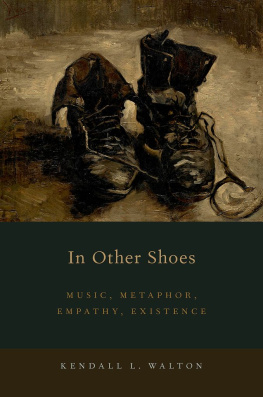Kendall L. Walton - In Other Shoes
Here you can read online Kendall L. Walton - In Other Shoes full text of the book (entire story) in english for free. Download pdf and epub, get meaning, cover and reviews about this ebook. year: 2014, publisher: Oxford University Press USA, genre: Science. Description of the work, (preface) as well as reviews are available. Best literature library LitArk.com created for fans of good reading and offers a wide selection of genres:
Romance novel
Science fiction
Adventure
Detective
Science
History
Home and family
Prose
Art
Politics
Computer
Non-fiction
Religion
Business
Children
Humor
Choose a favorite category and find really read worthwhile books. Enjoy immersion in the world of imagination, feel the emotions of the characters or learn something new for yourself, make an fascinating discovery.
- Book:In Other Shoes
- Author:
- Publisher:Oxford University Press USA
- Genre:
- Year:2014
- Rating:3 / 5
- Favourites:Add to favourites
- Your mark:
- 60
- 1
- 2
- 3
- 4
- 5
In Other Shoes: summary, description and annotation
We offer to read an annotation, description, summary or preface (depends on what the author of the book "In Other Shoes" wrote himself). If you haven't found the necessary information about the book — write in the comments, we will try to find it.
In Other Shoes — read online for free the complete book (whole text) full work
Below is the text of the book, divided by pages. System saving the place of the last page read, allows you to conveniently read the book "In Other Shoes" online for free, without having to search again every time where you left off. Put a bookmark, and you can go to the page where you finished reading at any time.
Font size:
Interval:
Bookmark:


Oxford University Press is a department of the University of Oxford. It furthers the Universitys objective of excellence in research, scholarship, and education by publishing worldwide.
Oxford New York
Auckland Cape Town Dar es Salaam Hong Kong Karachi
Kuala Lumpur Madrid Melbourne Mexico City Nairobi
New Delhi Shanghai Taipei Toronto
With offices in
Argentina Austria Brazil Chile Czech Republic France Greece
Guatemala Hungary Italy Japan Poland Portugal Singapore
South Korea Switzerland Thailand Turkey Ukraine Vietnam
Oxford is a registered trademark of Oxford University Press in the UK and certain other countries.
Published in the United States of America by
Oxford University Press
198 Madison Avenue, New York, NY 10016
Oxford University Press 2015
All rights reserved. No part of this publication may be reproduced, stored in a retrieval system, or transmitted, in any form or by any means, without the prior permission in writing of Oxford University Press, or as expressly permitted by law, by license, or under terms agreed with the appropriate reproduction rights organization. Inquiries concerning reproduction outside the scope of the above should be sent to the Rights Department, Oxford University Press, at the address above.
You must not circulate this work in any other form and you must impose this same condition on any acquirer.
Library of Congress Cataloging-in-Publication Data
Walton, Kendall L., 1939
[Essays. Selections]
In other shoes : music, metaphor, empathy, existence / Kendall L. Walton.
pages cm
Includes index.
ISBN 9780195098716 (hardcover : alk. paper)ISBN 9780195098723 (pbk. : alk. paper)
eISBN 9780190232436
1. Aesthetics. 2. MusicPhilosophy and aesthetics. 3. ArtPhilosophy. I. Title.
BH39.W327 2015
781.17dc23
2014021506
Many of my thoughts about the disparate topics listed in my subtitle have something to do, positively or negatively, peripherally if not centrally, with what I call other-shoe imaginative experiences. Empathy will probably seem to most of us to involve such experiences; the other topics may not. But in Empathy, Imagination, and Phenomenal Concepts, I argue that to empathize is not necessarily to engage in other-shoe imagining, nor indeed to engage in imagining of any kind. In Thoughtwritingin Poetry and Music, I claim that the appreciation of expressive qualities of much poetry and music, which has often been said to consist in something like other-shoe experiences, does not necessarily, and also need not involve imagining at all. This volume might better have been titled, In and Out of Other Shoes. Moreover, although Fictionality and Imagination: Mind the Gap concerns other-shoe experiences only indirectly, it too treats imagination negatively. It argues, contrary to the position I took in previous writings, that prescriptions to imagine a proposition are not sufficient for its being fictional, true in a fictional world. It will be evident, nevertheless, from other essays in this collection, that I think imaginings, in particular other-shoe imaginings, play important though varied roles in many areas where they may not be suspected.
Although shoes are designed to be worn by persons, many stand empty for much of their lives; some are never worn at all. My title relies on the metaphor of imagining oneself in, imaginatively occupying, someone elses shoes, but it focuses on the shoes themselves, not their wearers. Some of the essays do examine experiences of imaginative identification with a person (actual or fictitious) or other imaginings targeting a person. But these are special cases of other-shoe experiencesby which I mean imagining oneself in a certain situation, or having certain experiences, or being a certain way, whether or not one has in mind another person (actual or fictional or imaginary or hypothetical) who is in that situation or undergoes those experiences or is that way. A recurring theme in much of my writing has been resistance to the often gratuitous and distorting postulation of fictional or imagined beings whose shoes appreciators imagine occupying, and insistence on the prevalence and importance of mere other-shoe experiences.
I present the following essays, with one exception, in reverse chronological order, has been widely misunderstood. Spelunking was designed partly as an antidote, clarifying my earlier discussions and also expanding on them. I urge readers interested in the nature of appreciators emotional responses to fiction to consult Spelunking alongside Fearing Fictions and the related parts of Mimesis.
Readers who want to pursue particular issues according to their own interests will find discussions of the following topics in the chapters listed below (in some cases without using these words):
Empathy: .
Existence and fictitious entities: .
Expression in the arts: .
Fictionalist metaphysical theories: .
Fictionality (truth in fiction): .
Ineffability: .
Mental simulation and emotional contagion: .
Metaphor: .
Music: .
Narrators, apparent (fictional, implied) artists, musical personae: .
Prop oriented make-believe: .
Responses (especially emotional responses) to fiction: .
I have added postscripts to some of the previously published essays and inserted new notes [in square brackets] in many of them, some pointing out connections or conflicts with more recent writings by other theorists, or links among my own. I apologize for occasional overlaps among the essays. Each is designed to stand alone.
An approximation thereof anyway; the date of origin of some of them is ambiguous.
Mimesis as Make-Believe (Cambridge, MA: Harvard University Press, 1990).
Definitions of empathy are all over the map. But one ingredient usually included is the idea that empathy is or essentially involves a special kind of imagining, an imaginative experience described variously as role taking, perspective taking, imaginative identification, or imagining oneself in another persons shoes. I shall argue that, although many or most empathetic experiences do involve some such imaginative experience, empathy is best understood as not requiring this, indeed not requiring any imagining at all. The work imagination is supposed to do is actually accomplished instead by the deployment, in empathetic experiences, of phenomenal concepts.
Empathy, as I understand it, always has an object, a target; it is like sympathy in this respect. To empathize is necessarily to empathize with someone or something. My account will provide a simple and satisfying answer to them.
Empathy must have a target; simulation neednt. (There may be other differences as well.) My interest now is in empathy.
Empathy is often said to be a source of knowledge about the mental state or activities of the person empathized withknowledge of a special kind, Verstehen, or knowledge of what it is like for the target, not, it is said, mere propositional knowledge. My account will explain how empathy might provide (or constitute) such knowledge. But I will argue that it is best understood as propositional, as a special kind of propositional knowledge.
We must, of course, allow that one who seems to know or understand a target by empathizing with him may get him wrong. If we take empathy to be a success term, as I prefer to do, this will be a case of merely apparent empathy; it may amount to an illusion about how it is with the target. I make no claims about how often empathizers are right about their targets, nor how likely one is to be right in any particular case. We often have the impression of empathizing successfully in any case, and such impressions, illusory or not, figure importantly in our thinking about others and our interactions with them.
Font size:
Interval:
Bookmark:
Similar books «In Other Shoes»
Look at similar books to In Other Shoes. We have selected literature similar in name and meaning in the hope of providing readers with more options to find new, interesting, not yet read works.
Discussion, reviews of the book In Other Shoes and just readers' own opinions. Leave your comments, write what you think about the work, its meaning or the main characters. Specify what exactly you liked and what you didn't like, and why you think so.













